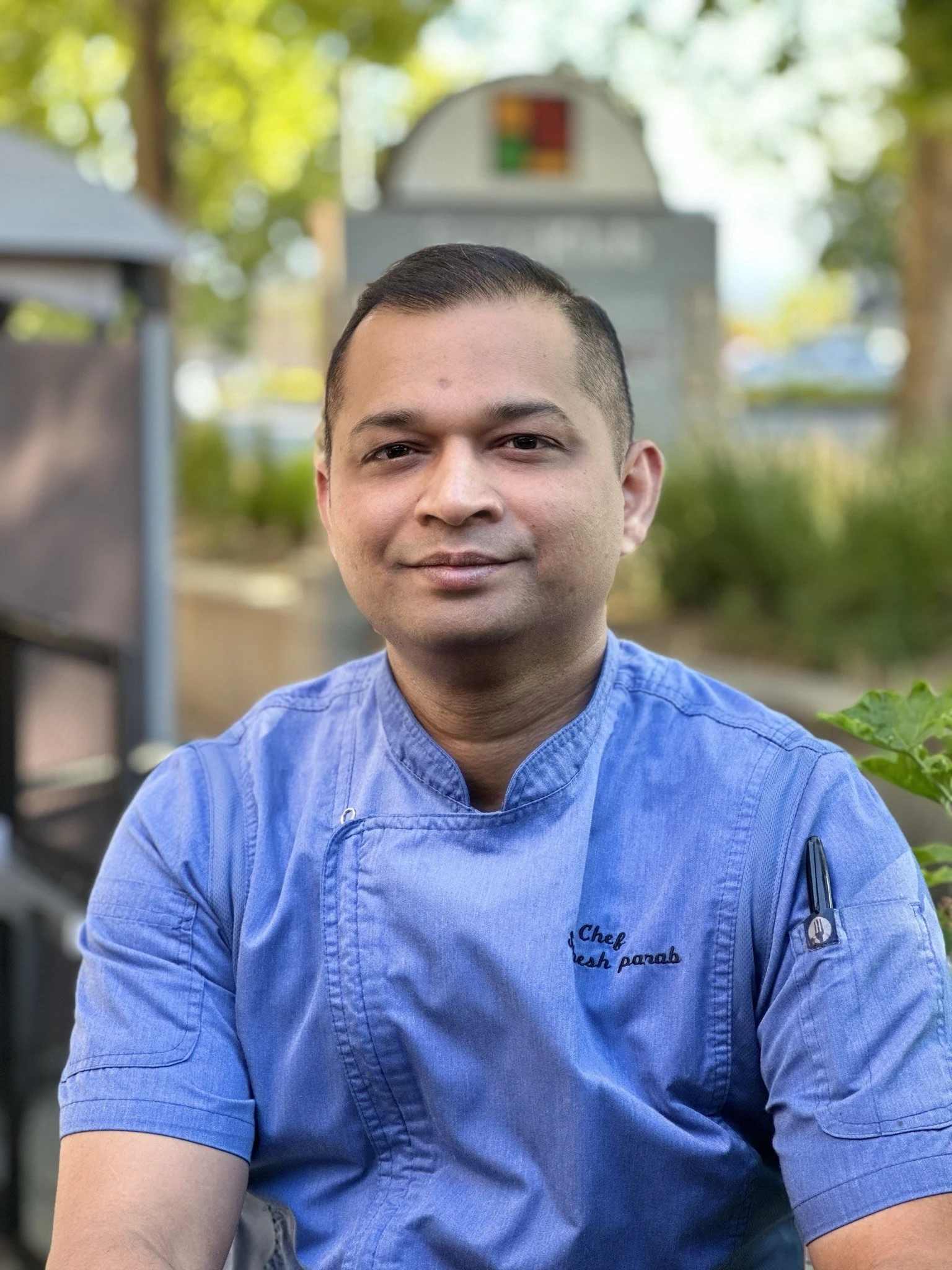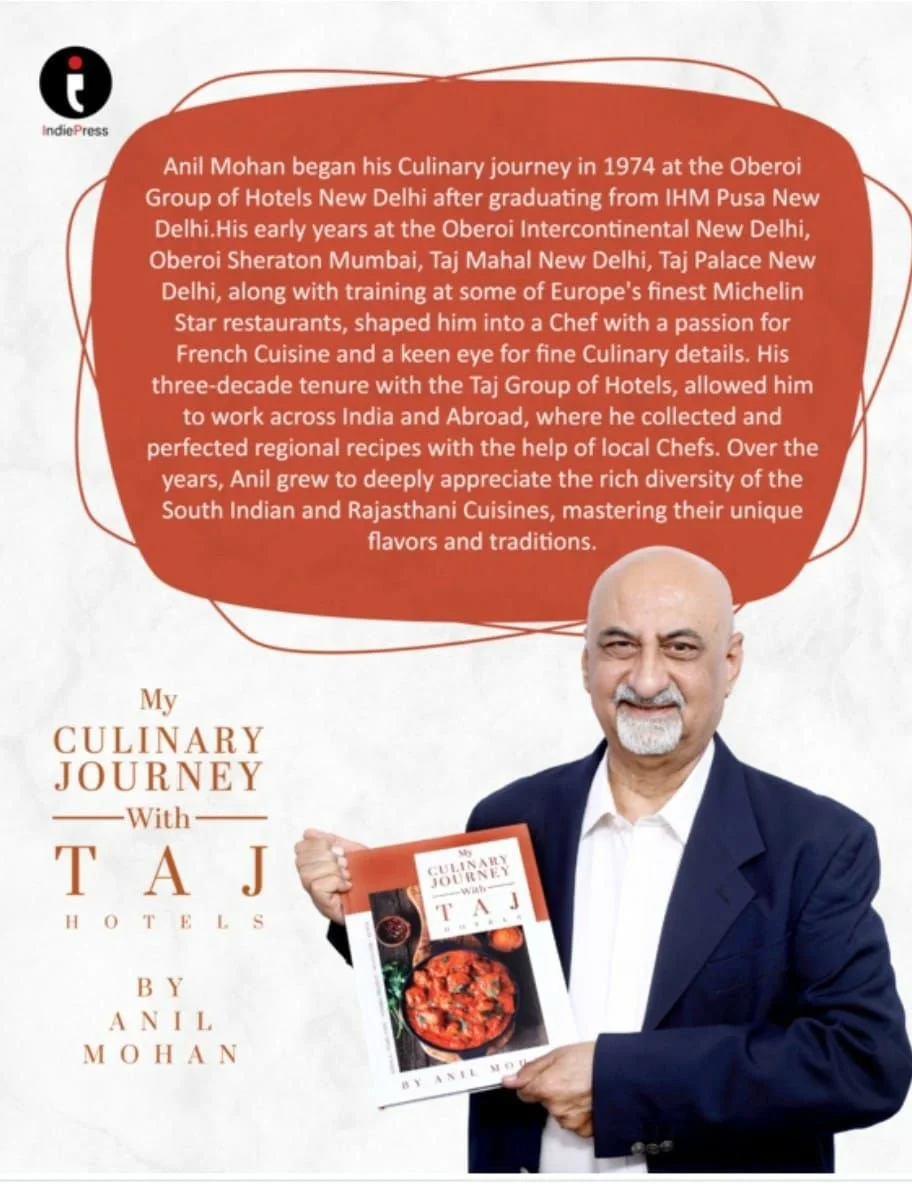Exclusive Interview | Chef Siddhesh Parab, Corporate chef, Spice klub , Cupertion, California
/“I hope to inspire the next generation of chefs to see the vast potential in plant-based cooking and to approach it with passion, innovation, and a commitment to impact. Together, we can elevate vegetarian cuisine into a future that’s healthier, more exciting, and better for our planet.”
As a pioneer in vegetarian cuisine, what inspired you to focus on transforming vegetarian gastronomy, and what challenges have you faced along the way?
Pioneers in vegetarian cuisine are often inspired by a combination of personal ethics, a commitment to sustainability, and a desire to demonstrate that plant-based meals can be as delicious, satisfying, and complex as any meat-based dish. For many, the journey begins with a deep passion for plants and a curiosity to explore their potential to create vibrant, diverse meals that challenge preconceived notions about vegetarian food being bland or limited.
One common challenge in transforming vegetarian cuisine is the need to innovate without relying on traditional animal-based ingredients that contribute flavor, texture, or richness—like butter, cheese, or meat stock. Developing umami flavors, achieving satisfying textures, and ensuring balanced nutrition can be a creative struggle, requiring chefs to explore spices, fermentation, and novel cooking techniques.
Another challenge has been overcoming cultural biases; some diners may still view vegetarian dishes as “incomplete” or “just side dishes.” Pioneers in this field often strive to elevate vegetarian meals to show they’re not only nutritious and eco-friendly but also gourmet-worthy.
The establishment of your 300-seat vegetarian restaurant in Bangalore has gained significant attention. What sets this restaurant apart from other vegetarian establishments?
The 300-seat vegetarian restaurant in Bangalore stands out due to its innovative approach to vegetarian cuisine and a unique dining experience. Here are a few key aspects that set it apart. The restaurant sources ingredients from local, organic farms, ensuring the freshest produce while supporting sustainable agriculture and reducing environmental impact.
While rooted in traditional Indian flavors, the menu also draws inspiration from global vegetarian cuisines, offering dishes that blend Indian culinary techniques with Mediterranean, East Asian, and Middle Eastern flavors.
The restaurant goes beyond typical vegetarian fare by experimenting with advanced techniques like molecular gastronomy, fermentation, and smoking. Each dish is crafted to create unique textures, flavors, and presentations, showing that plant-based meals can be both intricate and indulgent.
Beyond dining, the restaurant hosts regular cooking classes, workshops, and tasting events to educate the community on vegetarian cooking techniques and sustainable practices. This connection to the community fosters a sense of shared values and curiosity.
Its emphasis on sustainability, mindful eating, calming interior design, innovation, and education has helped redefine what vegetarian restaurants in Bangalore can offer.
You’ve been a jury member for competitions like The India Bakery & Pastry Challenge. How has this experience shaped your views on culinary trends and innovation?
Serving as a jury member for competitions like The India Bakery & Pastry Challenge has been incredibly insightful, especially in understanding how culinary trends evolve and where the future of the industry is headed. It has deepened my appreciation for how much innovation is happening in bakery and pastry arts, even within the constraints of traditional techniques.
This experience has particularly shaped my views in a few areas:
Focus on Ingredient Integrity, emphasizing the quality and origin of their ingredients.
Reimagining Classics, reinventing traditional Indian sweets and pastries with modern techniques or global twists.
Plant-Based and Allergen-Friendly Innovations
Attention to Visual Presentation
Overall, being part of these competitions has broadened my perspective on how diverse, adaptable, and boundary-pushing the culinary world is becoming.
Your restaurant concepts, Spiceklub and Quattro Ristorante, have captivated diners. What was your vision behind these establishments?
The vision behind Spiceklub and Quattro Ristorante was to reimagine traditional dining by offering something unexpected and immersive for diners.
For Spiceklub, the idea was to celebrate Indian flavors with a modern twist. Indian cuisine is rich and beloved, but I wanted to surprise guests by incorporating molecular gastronomy and experimental plating techniques. Through liquid nitrogen, foams, and spherification, familiar Indian dishes are reinterpreted to spark curiosity and excitement while still delivering the bold flavors people love.
Quattro Ristorante, on the other hand, was inspired by a love for Italian and Mexican cuisines, two culinary traditions known for their comfort and warmth. At Quattro, we use techniques like smoking and dehydrating to create textures and flavors typically associated with non- vegetarian ingredients, showing diners that vegetarian food can be as hearty and satisfying as any other.
You are known for staying updated with global food trends by attending events like Gulf Foods and Aahar. How do these experiences influence your culinary style?
Attending international events like Gulf Foods and Aahar has been invaluable in keeping me connected to global food trends, emerging ingredients, and the latest culinary technologies. These experiences have not only expanded my culinary knowledge but have also directly influenced my approach to menu development, ingredient sourcing, and even sustainability practices. They have helped me adopt Innovative Techniques, Exploring New Ingredients, Staying Aligned with Dietary Trends, Incorporating Sustainability and for Networking and Collaboration.
With vegetarian cuisine gaining popularity, what innovations do you see emerging in this sector, and how are you incorporating them?
The rise of vegetarian cuisine has sparked a wave of innovations that are transforming how we view plant-based dining. Here are some key trends and innovations I see emerging, along with how I’m incorporating them to elevate the vegetarian experience:
Plant-Based Proteins Beyond Tofu and Paneer: I’m incorporating options like tempeh, jackfruit, and even lab-developed protein substitutes to create dishes that are protein-packed and texture-rich.
Using Fermentation to enhance Flavor, trying Umami-Enhanced Cooking. I also try incorporating Global Flavor Fusions, Alternative Sweeteners and Healthier Desserts options like coconut sugar, date syrup, and monk fruit in our desserts. Zero-Waste and Sustainable Practices is also something that we have recently started focusing on.
How do these experiences influence your culinary style?
These experiences have a profound impact on my culinary style, keeping it dynamic, globally inspired, and responsive to evolving tastes and dietary preferences. Each event, interaction, and new discovery brings fresh ideas that help me refine my approach to creating vegetarian cuisine.
Events like Gulf Foods and Aahar highlight both timeless techniques and contemporary advancements. This balance between tradition and innovation has become central to my style. I draw on authentic flavors and methods but am open to incorporating molecular gastronomy or unexpected ingredients to add a unique twist to familiar dishes.
Focus on Presentation and Experience: Seeing the artistry and creativity of chefs worldwide emphasizes the importance of presentation in modern dining. I now pay closer attention to how dishes are plated and experienced, crafting meals that not only taste good but also engage the senses and tell a story.
Overall, these experiences help me stay inspired, keep my menus evolving, and ensure that each dish resonates with today’s diners in terms of flavor, health, and environmental consciousness.
How do you approach mentorship and talent development in the culinary field, given your experience as a competition jury member?
Mentorship and talent development are crucial to my approach in the culinary field, and my experience as a competition jury member has deepened my commitment to nurturing emerging talent. Being on the jury has given me a unique perspective on the dedication, creativity, and potential of young chefs, and I aim to foster those qualities in those I mentor.
I believe Encouraging Creative Exploration, Building a Strong Foundation in Fundamentals, Instilling Discipline and Professionalism and Creating Opportunities for Real-World Experience are the key aspects I keep in mind while I look into Talent development.
Ultimately, I view mentorship as a way to guide, inspire, and challenge the next generation of chefs. My goal is to help them develop not only the technical skills but also the mindset, creativity, and professionalism they’ll need to succeed and innovate in the culinary world.
What techniques or ingredients do you find essential for creating impactful and memorable vegetarian dishes?
Creating impactful and memorable vegetarian dishes requires a thoughtful blend of techniques and ingredients that add depth, complexity, and a variety of textures. I rely on techniques like Building Umami with Natural Ingredients i.e using ingredients like mushrooms, miso, soy sauce, tomatoes, and aged cheese to build this savory depth, Layering Flavors with Spices and Herbs, Playing with Textures like crispy, creamy, crunchy elements, Highlighting Seasonal and Local Produce while also using global ingredients, experimenting with smoking, fermentation, acidity and so on.
By focusing on layers of flavor, texture, and presentation, I strive to make each dish a complete experience that appeals to all senses.
Looking to the future, what are your goals for advancing vegetarian cuisine, and how do you envision inspiring the next generation of chefs?
My goals for advancing vegetarian cuisine are focused on pushing the boundaries of what plant-based dining can offer, while making it more accessible, sustainable, and inspiring for both diners and chefs.
I hope to inspire the next generation of chefs to see the vast potential in plant-based cooking and to approach it with passion, innovation, and a commitment to impact. Together, we can elevate vegetarian cuisine into a future that’s healthier, more exciting, and better for our planet.




